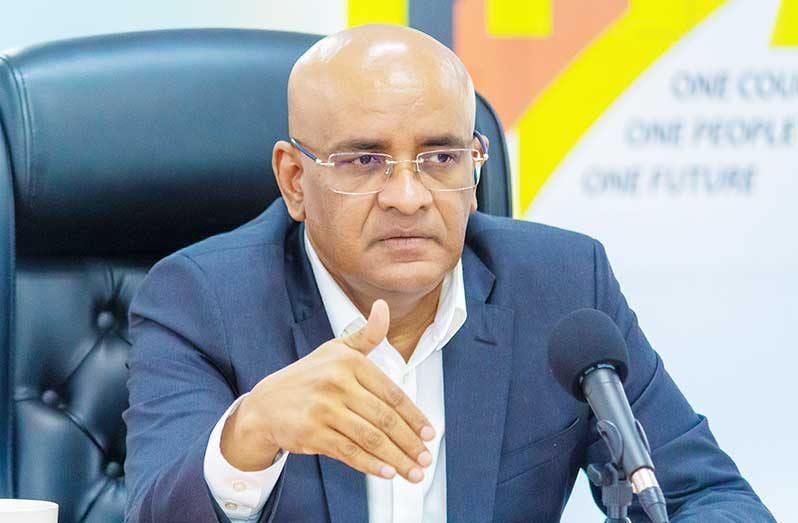PEOPLE’S Progressive Party (PPP) General Secretary Dr. Bharrat Jagdeo last Thursday tore into the Opposition’s recent barrage of “wild, vague” promises, emphasising that the party has no planning capability.
During his weekly press conference at Freedom House on Robb Street, the General Secretary dismissed the recent electoral promises made by the People’s National Congress/Reform (PNC/R) as it relates to the Indigenous Peoples.
He underscored that the Opposition’s latest pledges haven’t showcased any real vision for development.
“You know, almost every measure that they promise, nothing is about development,” he said.
The General Secretary, who also serves as Guyana’s Vice-President, noted that even in the Opposition’s policy pronouncement, they have already made it conditional.
“Everything is so vague in their promises. So, they’re not talking about education or healthcare or housing, etc; they’re just making wild promises,” Dr. Jagdeo said.
He underscored that the promise of cash handouts to Indigenous communities proposed by the Opposition is an evident example of their ignoring the pressing needs of those thousands of people.
“So, it’s not a lot of money they’re promising, but you notice they didn’t promise anything for village development. That is what APNU does. APNU is a party bereft of any planning capability,” he noted.
The General Secretary did not stop there, but went on to even reference the Opposition’s inept Green State Strategy that they developed.
He pointed out that it was a cut-and-paste operation reliant on foreign consultants rather than local, sustainable policy.
He added that this sort of policy-making approach by the Opposition fails to adapt to the local context, and does not reflect the type of party it was known to be in the past.
“They brought a serious party down to the dogs. Really, this used to be the PNC; it was known in the past for an intellectual tradition, even if you didn’t agree with them,” the VP said.
Highlighting the distinction between the current PPP/C-led administration and the now PNC/R-led opposition, Dr. Jagdeo pointed to key achievements, such as increased employment, infrastructure improvements, and land titling.
The previous government, he noted, spent $5.8 billion on capital projects across four regions over a five-year period.
By contrast, the PPP/C government, according to Dr. Jagdeo, invested $6.5 billion in a single initiative; the cash-grant distribution programme.
This amount, he emphasised, surpassed what the previous administration spent on key infrastructural development in hinterland communities.
“That’s the magnitude of the difference; we spend in a single year more than what they have spent the five years in some of the regions,” he said.
He also noted that the government is currently constructing four secondary schools in the hinterland areas, including at places like Kwebana, Hosororo, and Karassabai.
The combined investment, in just these four schools alone, surpasses the total capital budget allocated across all sectors over the Opposition’s term in office.
That, according to Dr. Jagdeo, gives a sense of the scale of development happening in these regions. And that’s not even considering other infrastructural projects, such as the roadworks in communities like Maburuma Settlement leading to Hosororo, or the development in the Moruca area and beyond.
“This level of investment reflects a strong commitment to accountability, and highlights the scale of our efforts,” he said, adding: “In addition to this, $1.5 billion is being invested in housing.”
Also, approximately $32 billion has been invested, through the Ministry of Amerindian Affairs alone, excluding spending on health and education.
This funding was channelled through initiatives such as the Amerindian Development Fund, the presidential grant, and support programmes for youth and women’s development in these communities. This figure does not include the additional infrastructural work, such as roads already completed in these areas.
The Hinterland Scholarship Programme by itself accounted for over $400 million.
Dr. Jagdeo further pointed to a key initiative that exists today because of the innovation and leadership of the PPP government: The Low-Carbon Development Strategy 2030 (LCDS 2030).
Over the past three years, Amerindian communities have received substantial funding through this programme: US$22.7 million (or G$4.7 billion) to be precise, in the first year; US$23.27 million (around G$4.8 billion) in the second year; and another US$22.7 million (about G$4.73 billion) this year.
Altogether, this adds up to more than $14 billion in support, enabling these communities to carry out nearly 4,000 projects aimed at local development.












